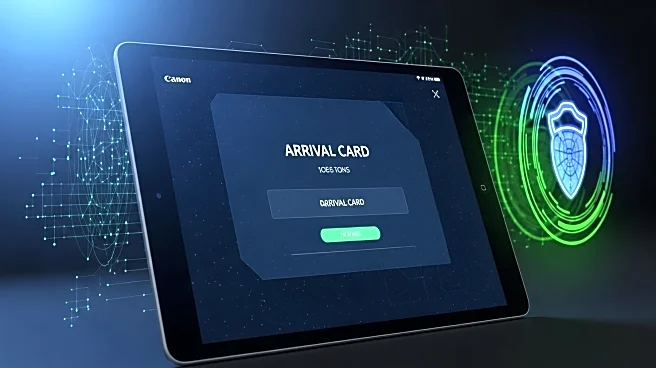What's Happening?
Taiwan has introduced a new digital arrival card system for all incoming visitors, requiring applications to be submitted three days in advance. This initiative, led by the Ministry of the Interior National Immigration Agency Republic of China Taiwan (MINIA), aims to streamline the travel process and enhance security. The card is free and requires submission of personal information such as passport details, email, occupation, phone number, and travel accommodation details. In 2024, Taiwan saw over 7.5 million visitors, with the U.S. being the fourth-largest source of visitors. Mainland Chinese visitors are also required to fill out the new form. This update reflects a global trend towards modernizing travel systems with increased oversight and tighter security measures.
Why It's Important?
The implementation of the digital arrival card system in Taiwan is significant as it aligns with global efforts to enhance border security and streamline travel processes. For the U.S., being a major source of visitors to Taiwan, this development could impact travel plans and necessitate adjustments for American tourists and business travelers. The move also highlights Taiwan's commitment to maintaining secure and efficient travel protocols, which could influence similar policies in other countries. Additionally, the requirement for advance application may affect last-minute travel plans, emphasizing the need for travelers to plan ahead.
What's Next?
As Taiwan enforces this new system, travelers will need to adapt to the requirement of applying for the digital arrival card in advance. This may lead to increased awareness and preparation among tourists and business travelers. The system's success could prompt other countries to adopt similar measures, further influencing global travel protocols. Stakeholders such as airlines and travel agencies may need to update their processes to accommodate these changes, ensuring travelers are informed and compliant with the new requirements.
Beyond the Headlines
The introduction of digital arrival cards in Taiwan could have broader implications for privacy and data security, as travelers are required to submit personal information. This raises questions about how such data is stored, used, and protected, potentially influencing global discussions on data privacy in travel. Additionally, the move may encourage other countries to explore digital solutions for border management, potentially leading to a shift towards more technologically advanced and secure travel systems worldwide.









